Are you searching for natural ways to lower cholesterol? You might be surprised to find out that some herbs can help. With many plant-based options out there, it’s hard to know which ones work best. Studies show that taking up to 3.3 grams of phytosterols daily can lower LDL cholesterol by 6 to 12% in about four weeks.

Natural remedies like herbs to lower sterol are gaining popularity. They offer a good alternative to traditional medicines. But, what are the top plant sterol supplements for lowering cholesterol, and how do they work?
Key Takeaways
- Herbs to lower sterol can be an effective way to manage cholesterol levels
- Plant-based sterol-lowering supplements, such as phytosterols, can lower LDL cholesterol by 6 to 12%
- Natural remedies for reducing cholesterol levels, such as fiber supplements and omega-3 fatty acids, can be a great alternative to traditional medications
- Consuming 1.5 ounces of walnuts daily can lower the risk of heart disease
- Substituting soy protein for other proteins can lower LDL cholesterol and triglycerides
- Phytosterols can lower LDL cholesterol by interfering with intestinal cholesterol absorption
Understanding Plant Sterols and Their Role in Cholesterol Management
Plant sterols are found in foods like whole grains, fruits, and veggies. They help lower LDL cholesterol by blocking its absorption in the intestine. You can find them in fortified foods and supplements. To see benefits, aim for 1 gram a day, with 2 to 3 grams for the best results.
When looking at cholesterol-lowering herbs and herbal remedies for high cholesterol, knowing how plant sterols work is key. They can lower LDL cholesterol but don’t change HDL or triglycerides much. This makes them a good choice for those wanting to naturally lower cholesterol. A 2022 study showed that eating foods with plant sterols and living healthy can lower LDL cholesterol in people with high cholesterol.
Common plant sterols include beta-sitosterol, campesterol, and stigmasterol. You can find them in oils, fruits, and veggies. Even though our bodies can’t make them, eating them can increase their levels and lower cholesterol absorption.
The Science Behind Herbs to Lower Sterol
Understanding how herbal supplements for reducing cholesterol work is key. Studies show that some herbs, like garlic, can lower cholesterol. They do this by stopping cholesterol from being absorbed and helping it get excreted. These herbs for managing cholesterol levels use complex ways to help, making them great for holistic approaches to lower sterol levels.
It’s important to know the benefits of herbal supplements and how they fit into managing cholesterol. Some supplements work best when used with diet changes or lifestyle tweaks. Learning about the science behind these supplements helps people make smart choices.
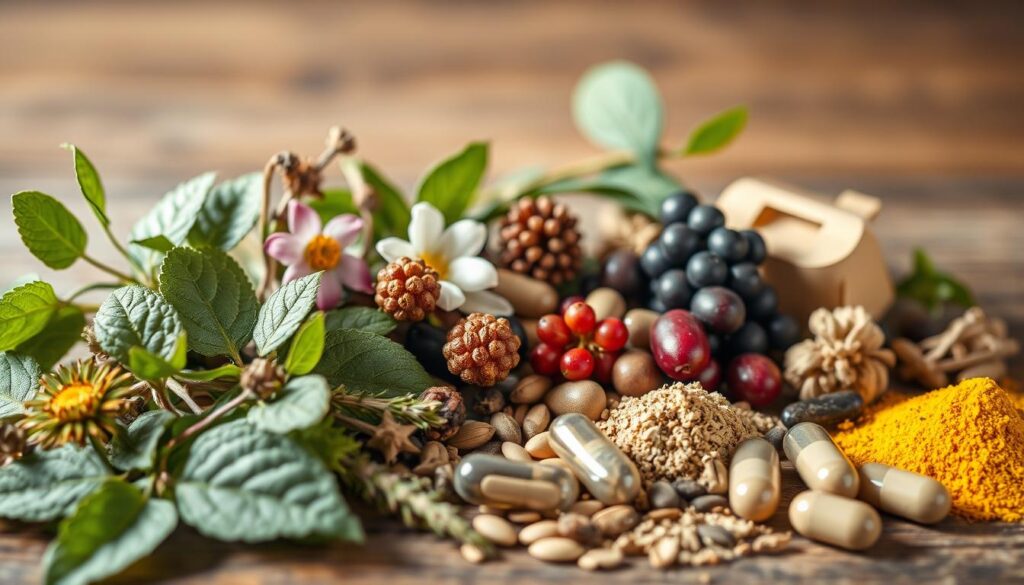
Research shows that eating foods rich in phytosterols can lower cholesterol and even reduce cancer risk. These foods can cut total cholesterol by 5% to 10% and LDL cholesterol by 5% to 20%. Knowing how to use herbal supplements for reducing cholesterol can be a big step in managing cholesterol naturally.
| Supplement | Effect on Cholesterol |
|---|---|
| Garlic | Lowers cholesterol levels by inhibiting cholesterol absorption |
| Fiber | Enhances cholesterol excretion |
| Phytosterols | Reduces cholesterol absorption by 30% to 40% |
Most Effective Plant-Based Supplements for Cholesterol Control
Plant-based sterol-lowering supplements can help manage cholesterol levels. They are a good addition to a healthy diet and lifestyle. These supplements may lower the risk of heart disease. Red yeast rice, garlic extract, berberine, and green tea extract are among the most effective.
These cholesterol-lowering herbs have shown promise in reducing cholesterol. For instance, red yeast rice can lower LDL cholesterol by 15-25% in eight weeks. Garlic extract can also reduce LDL cholesterol by up to 9% with daily use.
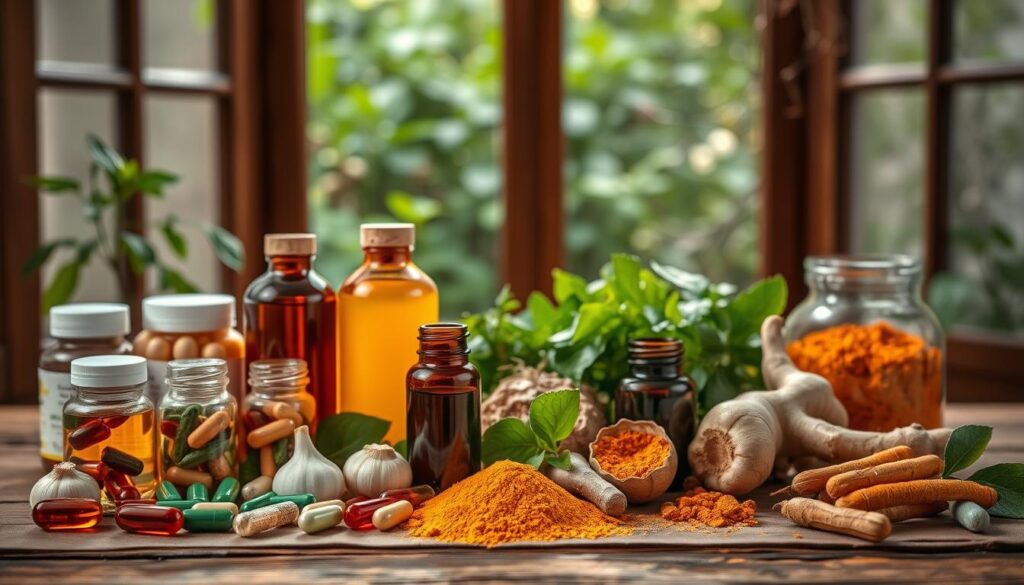
Other herbal remedies for high cholesterol include green tea extract and berberine. Green tea extract can modestly reduce cholesterol when taken regularly. Berberine has been found to lower LDL cholesterol and increase HDL cholesterol.
Top Rated Plant Sterol Supplements in the Market
Choosing the best plant sterol supplements can be tough with so many options. But, some stand out for lowering cholesterol and using top-notch ingredients. These natural remedies for reducing cholesterol levels are great for your diet.
Top picks include supplements with herbs to lower sterol like berberine, beta-glucan, and flaxseed oil. These plant-based sterol-lowering supplements help cut LDL cholesterol and triglycerides. They’re a solid choice instead of traditional meds.
Here are some key factors to consider when choosing a plant sterol supplement:
- Look for supplements that contain high-quality, natural ingredients
- Check the label for the recommended dosage and follow it carefully
- Consider consulting with a healthcare professional before starting any new supplement regimen
By picking a quality plant sterol supplement and eating well, you can lower cholesterol and heart disease risk. Always talk to a healthcare pro before starting any new supplements.
Essential Herbs That Naturally Lower Cholesterol Levels
Cholesterol-lowering herbs can be a great help in managing cholesterol. Certain herbal remedies for high cholesterol have been proven to improve cholesterol levels. For example, garlic, ginger, and turmeric help block cholesterol absorption and boost its removal from the body.
These herbs are effective ways to lower cholesterol naturally with herbs.
Some of the key herbs that can help lower cholesterol levels include:
- Garlic: known to reduce LDL cholesterol levels and boost HDL cholesterol
- Ginger: shown to lower total cholesterol and triglyceride levels
- Turmeric: associated with a better HDL-to-LDL ratio and improved lipid profiles
These cholesterol-lowering herbs can be added to your diet in various ways, like supplements or food. Always talk to a healthcare professional before starting any new herbal remedies for high cholesterol.
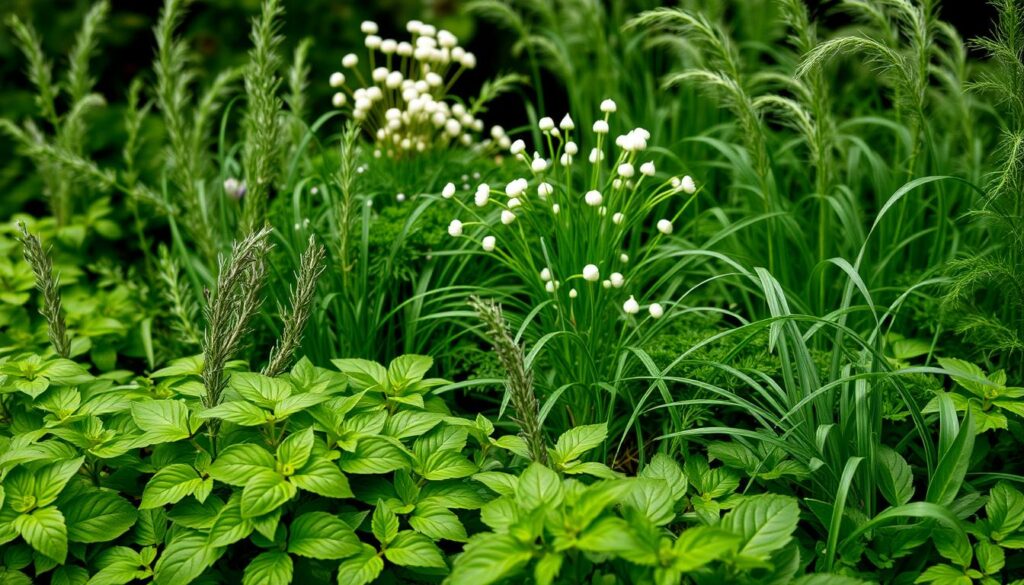
By using these ways to lower cholesterol naturally with herbs along with a healthy diet and lifestyle, you can manage your cholesterol levels well. This can help lower your risk of heart disease.
| Herb | Benefits |
|---|---|
| Garlic | Reduces LDL cholesterol levels, boosts HDL cholesterol |
| Ginger | Lowers total cholesterol and triglyceride levels |
| Turmeric | Improves HDL-to-LDL ratio, enhances lipid profiles |
Combining Supplements with Lifestyle Changes
Managing cholesterol levels can be easier when you mix herbal supplements for reducing cholesterol with lifestyle changes. This approach can lead to better results and improve your health. Adding herbs for managing cholesterol levels to your daily routine is a proactive step.
Start by making dietary modifications like eating more soluble fiber. This can lower LDL cholesterol. Also, try exercise recommendations like regular aerobic activity to raise HDL cholesterol. Plus, stress management techniques like meditation and yoga can help lower cholesterol.
Some lifestyle changes to consider include:
- Eating a healthy, balanced diet
- Getting regular exercise, such as walking or jogging
- Practicing stress-reducing techniques, such as meditation or deep breathing
- Getting enough sleep each night
- Quitting smoking and limiting alcohol consumption

By combining these lifestyle changes with holistic approaches to lower sterol levels, you can manage cholesterol levels effectively. This comprehensive approach improves your overall health.
Understanding Potential Side Effects and Interactions
When looking at plant-based sterol-lowering supplements, knowing about side effects and interactions is key. Cholesterol-lowering herbs and herbal remedies for high cholesterol can help, but they might also cause problems. This is especially true when taken with other medicines.
Common side effects include stomach issues like nausea and diarrhea. Some plant-based sterol-lowering supplements can also affect how well blood thinners work.
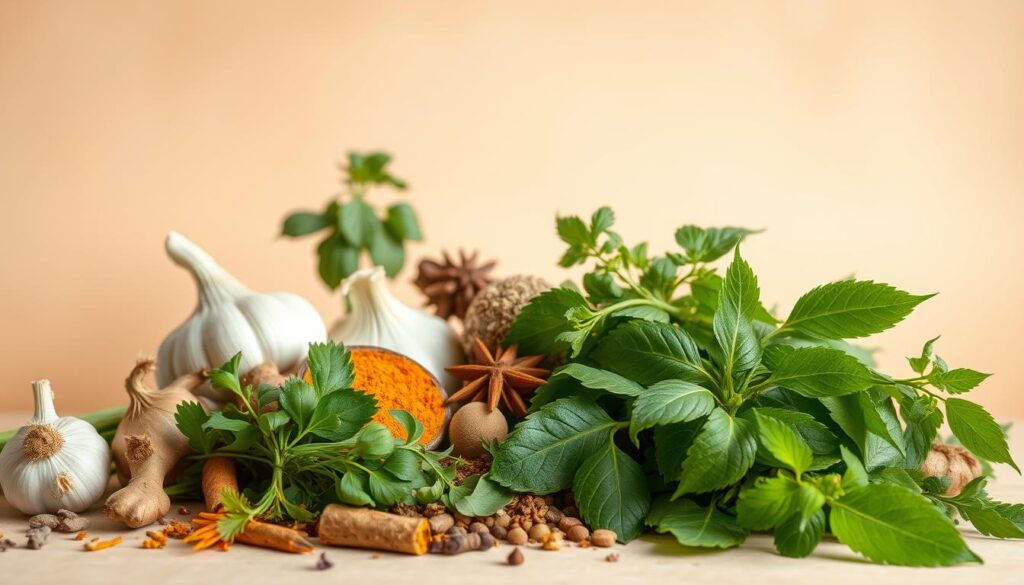
It’s important to talk to a healthcare provider before starting any herbal remedies for high cholesterol. They can help you understand the risks and benefits. They’ll also suggest the best treatment for you.
| Supplement | Potential Side Effects | Interactions |
|---|---|---|
| Red Yeast Rice | Gastrointestinal issues, muscle pain | Blood thinners, statins |
| Garlic Extract | Nausea, diarrhea, bad breath | Blood thinners, diabetes medications |
Knowing about side effects and interactions helps you make smart choices. This way, you can use plant-based sterol-lowering supplements and cholesterol-lowering herbs wisely to manage your cholesterol.
Monitoring Your Progress with Plant Sterol Supplements
When using herbs to lower sterol or natural remedies for reducing cholesterol levels, it’s key to watch your progress. Regular visits to your healthcare provider and checking your cholesterol levels are important. Plant-based sterol-lowering supplements can help lower cholesterol, but tracking your progress is crucial.
Some important stats to remember when tracking your progress include:
- About one-third of study participants saw a more than 20% drop in LDL cholesterol after six months.
- For another 31% of participants, LDL cholesterol fell by 15%.
- Consuming 2 g per day of plant sterols can lower LDL cholesterol by up to 10%.
By keeping an eye on your progress and making changes as needed, you can effectively use herbs to lower sterol and natural remedies for reducing cholesterol levels to reach your health goals. Always talk to your healthcare provider before starting any new supplements.
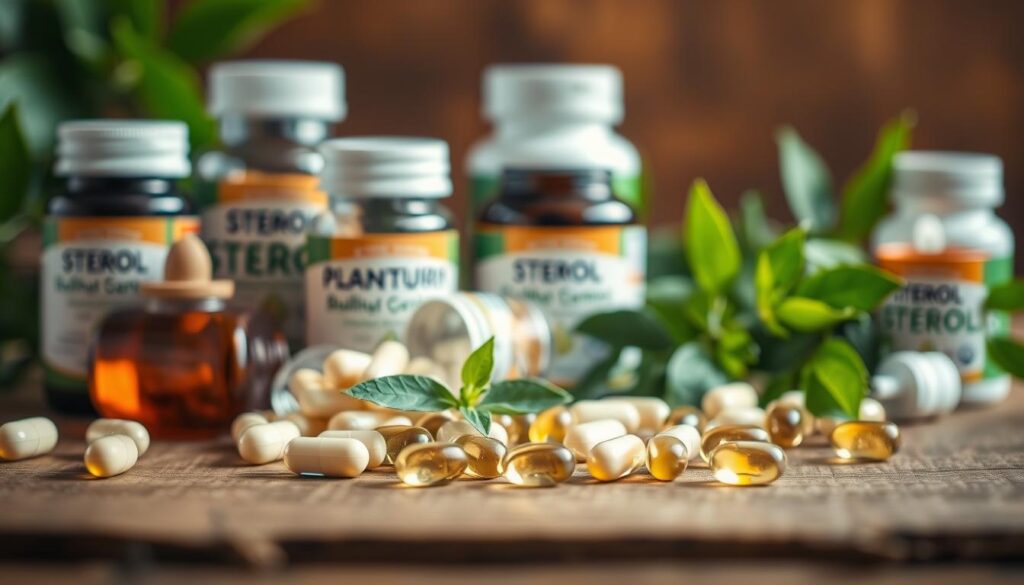
Safety Guidelines and Best Practices for Supplement Use
Using herbal supplements for cholesterol is important. You need to follow safety rules and best practices. This ensures they work well and don’t cause harm. Herbs like plant sterols and stanols can help manage cholesterol levels.
It’s key to pick high-quality supplements and use them wisely. Here are some tips to help you:
- Always talk to a healthcare provider before starting any new supplement. This is especially true if you have health issues or take medicines.
- Stick to the recommended dosage and don’t take more than the daily limit.
- Keep supplements in a cool, dry place. Make sure they’re away from sunlight and moisture.
By following these guidelines, you can safely use herbal supplements for cholesterol. This supports your heart health. Remember, a balanced diet, exercise, and stress management are also important.
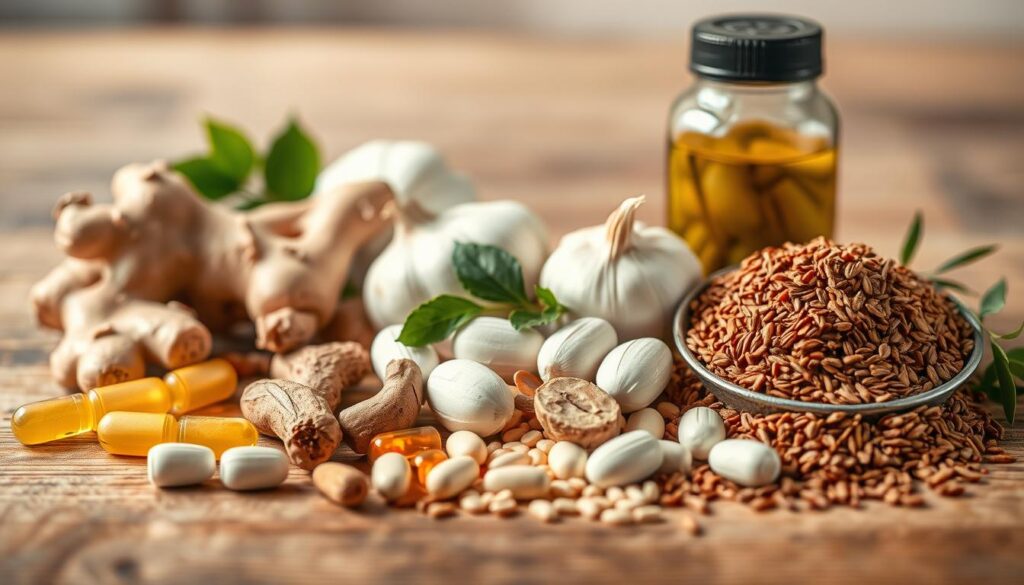
Conclusion: Making Informed Decisions About Sterol-Lowering Supplements
Adding plant-based sterol-lowering supplements to your routine can help manage cholesterol. The cholesterol-lowering herbs and herbal remedies for high cholesterol we talked about have shown great promise. They can lower LDL cholesterol and improve heart health.
Choosing the right sterol-lowering supplements is important. You should research them, talk to your doctor, and think about your health history. By following the advice in this article, you can make a smart choice. This way, you can use these supplements safely and effectively.
For the best results, combine supplements with healthy habits. Eating well and exercising regularly are key. Keep an eye on your progress and ask for medical advice when needed.
FAQ
What are the best herbs to lower sterol naturally?
Garlic, ginger, turmeric, and red yeast rice are great for lowering cholesterol naturally. They have been proven to help lower cholesterol levels. Adding them to your diet can be very beneficial.
How do plant sterols work to lower cholesterol?
Plant sterols are similar to cholesterol and can block its absorption in the intestines. This means less cholesterol is absorbed, helping to lower your cholesterol levels.
What are the most effective plant-based supplements for cholesterol control?
Red yeast rice, garlic extract, berberine, and green tea extract are top choices for cholesterol control. They have been shown to lower cholesterol levels effectively. Adding them to your supplements can be very helpful.
What are the potential side effects and interactions of plant-based supplements?
Plant-based supplements are usually safe, but they can have side effects and interact with medications. Always talk to your healthcare provider before starting any new supplements, especially if you’re on other medications.
How can I monitor my progress with plant sterol supplements?
To track your progress, regular check-ups with your healthcare provider are key. They can monitor your cholesterol levels and adjust your supplement plan as needed.

